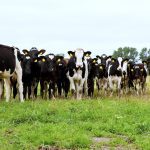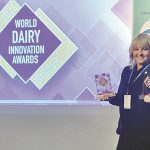Tag Archives Dairy Cattle

Uncontrolled ground current remains a silent killer for livestock
Progress on mitigating the issue issue has stalled after 2022 report

Dairy industry gets sustainability funding

Monitoring dairy cows’ water use has benefits
Maximizing water use efficiency should be a priority, says AAFC researcher

Reducing dairy methane starts with feed
AAFC researcher reviews what farmers can do to mitigate methane

World Dairy Innovation Awards recognizes Dairy Farmers of Canada
“Net Zero by 2050 — We’re In” campaign wins two categories

Bottle-fed bulls can grow up to be mean
Hand-rearing dairy bull calves in isolation contributes significantly to their behaviour toward humans as adults

U.S. researchers uncover emerging Holstein genetic defect
Affected recumbency calves unable to stand after birth

New research will look at dairy welfare and technology
The use of artificial intelligence to help farmers improve dairy animal care will be studied on Ontario and Quebec farms

Researchers work to develop Johne’s vaccine
Two Canadian universities are developing vaccines, with plans to see if they can be combined

Probiotic developed for dairy cattle
University of Alberta researcher says using probiotics to prevent infection could reduce disease and lower antibiotic use
